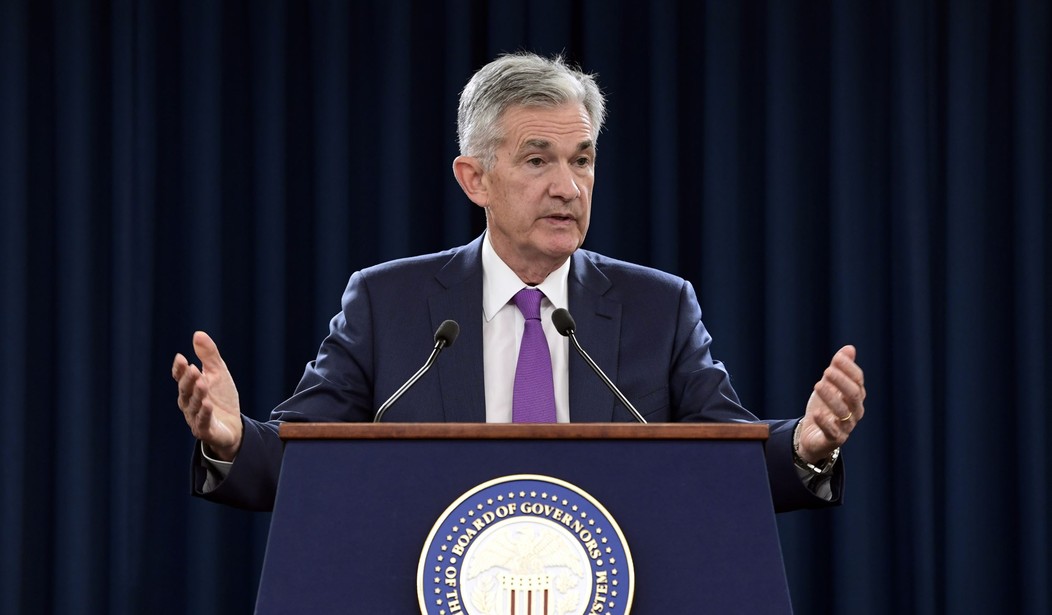The stock market is rebounding on the news that the Federal Reserve is considering an interest rate decrease, but some commentators are spinning this as a sign of economic calamity.
“We are closely monitoring the implications of these developments for the U.S. economic outlook and, as always, we will act as appropriate to sustain the expansion, with a strong labor market and inflation near our symmetric 2 percent objective,” Federal Reserve Chairman Jerome Powell said Tuesday.
Experts widely interpreted this as an indication that the Fed may soon implement a rate cut after raising rates steadily over the entire course of Donald Trump’s presidency.
President Trump has repeatedly encouraged such a move, pointing out that his policies have secured the robust economic growth, historically strong job market, and low inflation that the Fed is tasked with supporting.
Why, then, is the media wallowing in preposterous talk of impending economic devastation from “trade wars?”
These are the same people, remember, who insisted that President Trump’s election would tank the stock market, then spent the first two years of his presidency predicting that a recession was right around the corner even as the economy soared to record-breaking heights.
To these “experts,” any piece of economic news, no matter how encouraging, is an opportunity to claim that Donald Trump will ruin the economy.
The United States in now embarked on a historic mission to establish a mutually beneficial trade relationship with China after a generation of surrender by previous presidents. Similarly, Mexico is on notice that it must help us end the humanitarian crisis created by mass illegal immigration from Central America — or suffer penalties in the form of across-the-board tariffs.
Recommended
Both measures are vital to the national interest of the United States, and are well worth the minimal and temporary difficulties that may come with tariffs.
Of course, all tough trade sanctions like the ones the administration is using with China and Mexico entail some reciprocal costs, and it was in that context that Chairman Powell floated the idea of a rate cut.
Crucially, however, there is hardly any indication that the American economy cannot bear the temporary strain. The data continue to indicate that the full employment, robust wage gains, and steady GDP growth Americans have enjoyed over the last two years can and will continue.
All Chairman Powell was saying is that the Fed is prepared to do its part if the United States needs lower interest rates in order to keep the Trump economic boom going while these tense trade negotiations and tariff fights play out.
The only reason the Fed even has that ability to lower rates, though, is because President Trump’s pro-growth policies created such a stable, prosperous economy that Powell was able to impose a succession of rate hikes over the past two years.
After seven years during which the Fed was forced to hold interest rates near zero to avoid exacerbating the Great Recession, the central bank has raised rates eight separate times since Donald Trump’s election, most recently in December.
This is the textbook response to a period of strong economic growth, because reining in the boom helps to limit the severity of the inevitable bust that occurs at the other end of the business cycle.
Before the Trump boom, the Fed didn’t have the luxury of taking our economy off monetary life support because we continued to endure meager growth and high unemployment throughout the Obama years. If a trade dispute, stock market crash, or external supply shock had afflicted the American economy, we would have had no way to mitigate those ill-effects through monetary policy.
Now, that option is back on the table. There’s no reason the Fed shouldn’t consider using it — if it needs to.
Ken Blackwell served as the mayor of Cincinnati, Ohio and Ohio State Treasurer, and Ohio Secretary of State. He currently serves on the board of directors of the National Taxpayers Union and is an advisor to the Family Research Council.

























Join the conversation as a VIP Member